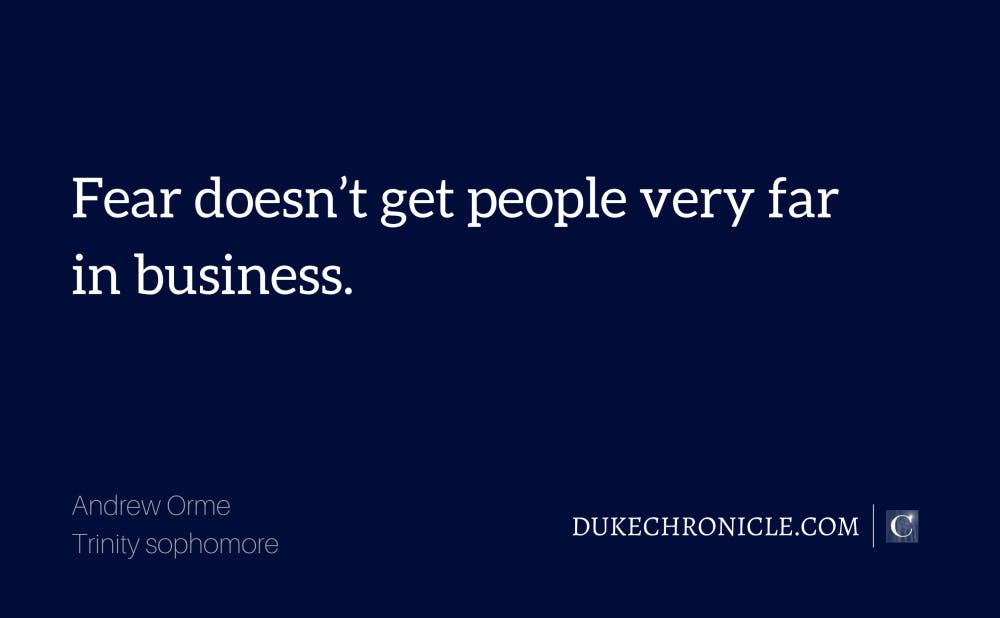I never really thought that I was going to drop a class—mostly out of stubbornness, but also because this semester, I decided to overload with classes that I was genuinely interested in. Yet, it was for the latter reason that I decided to drop arguably the most important class in the economics department.
I signed up for Economics 256 (Practical Financial Markets) thinking that because I was interested in finance and investing, this would be perfect. I dropped it for the same reason, to the en masse confusion of my friends who asked, “don’t you want to go into finance?”
The puzzled looks that I got when I was asked about the homework and I said, “sorry, I dropped the class” made me really think about what I wanted out of my Duke education. Taking a class which has the sole purpose of drilling students for interviews and networking events does not fit with that vision.
My vision for my education is not to “be like the Wharton kids.” Yes, I do want to go into finance, but there’s a reason I didn’t apply to Penn (notwithstanding that every high-achieving New York City 17-year-old and their mother applies there). For me, my undergraduate classes aren’t supposed to explicitly prepare me for a career: like any good liberal arts education, preparing for a career is supposed to be implicit. The problem solving skills, social skills and logical reasoning that I am gaining at Duke are far more important to my education than how to perfectly execute a Discounted Cash Flow analysis.
My interest in financial markets goes beyond the technical skills I could learn in class—I keep track of a large and diverse list of publicly-traded companies and read the Wall Street Journal every day, sometimes cover to cover.
Yes, I grew up in New York City with both parents working on Wall Street, where I learned that there is more to the business than simply cushy compensation. There is an incredible wealth of intellectual talent, and a wide array of ways to be successful in a business that to many seems monolithic.
When I sat in the LSRC lecture hall for Economics 256, I felt an overwhelming energy of desperation—people who were willing to do anything to achieve a certain income level because they believed that without it, they would be sacrificing a very comfortable future lifestyle. Between over an hour of berating, panicked questions about résumés and internships and the platitudes about making Duke students competitive with the products undergraduate business school (an educational concept that I find abhorrent), I felt that I may have been one of a mere handful of the 240 students in the class that was actually very interested in the subject beyond getting hired.
I’ve seen careerism at Duke before—mostly in a self-critical, humorous and oddly ironic way. Between the posts on Duke Memes for Gothicc Teens that called Duke the place “where dreams become consulting” and people constantly joking about ‘selling out’ and applying to summer analyst internships instead of going on DukeEngage, studying abroad or doing research, I knew that there were students who step on campus as a first-year with the goal of getting an impressive job offer. But until now, I always felt that these were normal—especially because I always got a vibe of good humor from them.
The attitude I experienced from two weeks in that class wasn’t humorous. It wasn’t particularly healthy. It was bleak: a new wrinkle in job-focused Duke competition that I previously hadn’t seen a problem with. It wasn’t particularly driven by interest, or even greed, for that matter: it was fear. Fear of not getting ‘ahead’; fear of being shut out of what is seen as one of the easiest ways to get generously paid quickly.
Fear doesn’t get people very far in business. A multi-decade career on Wall Street (when people really start getting paid), takes genuine interest in the business beyond a love of large paychecks. To me, that’s why people burn out of the two-year analyst programs so quickly, realizing that there isn’t much value in doing something just for the money.
So yes, I dropped a class that I’m genuinely interested in. Yes, I dropped it because I’m genuinely interested in the subject matter. No, I’m not worried about not getting a job because of that decision.
Andrew Orme is a Trinity sophomore. His column runs on alternate Fridays.
Get The Chronicle straight to your inbox
Sign up for our weekly newsletter. Cancel at any time.

